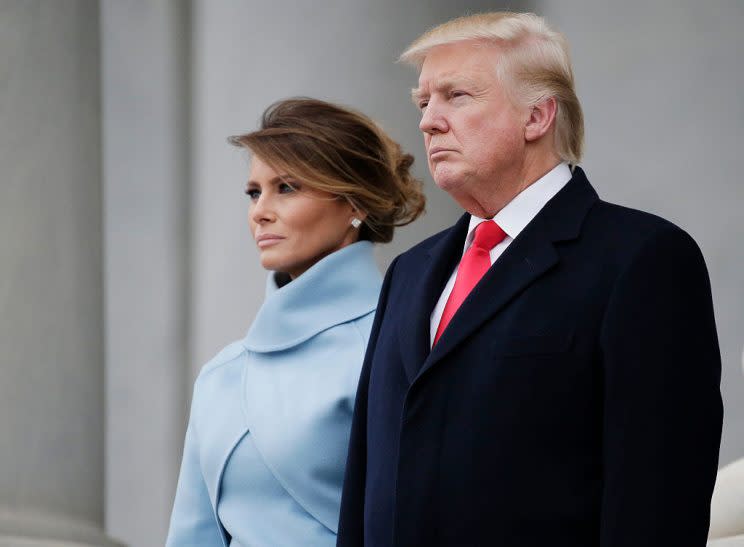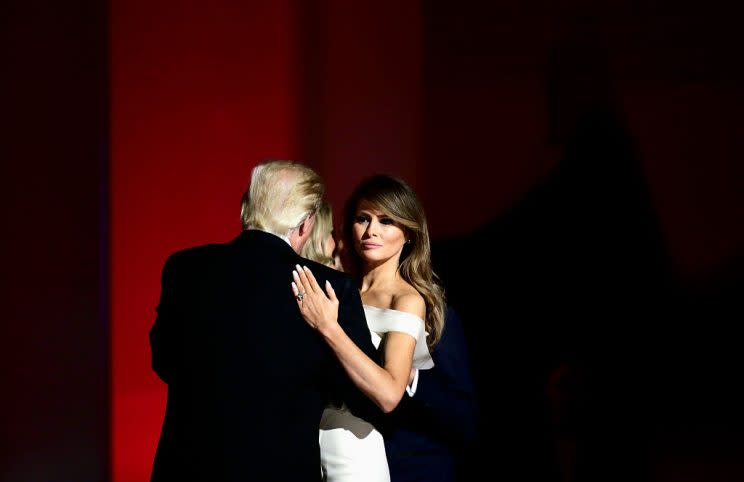Icy Vibes Between the Trumps: What's the Deal With Presidents and Rocky Marriages?

Less than a week in, and already Donald Trump’s marriage to First Lady Melania has been the topic of giddy stories and social media posts about the union’s possible implosion.
Two instances have gone viral: the inauguration video snippet that has FLOTUS swapping her fake grin for look of misery as soon as her husband turns away, and the images of Trump exiting his car at the White House, rudely leaving Melania in the dust before the Obamas politely step in to welcome her.
And while reactions have been divided — with some expressing sympathy for the First Lady and even likening her to a hostage (#FreeMelania was trending on Facebook on Wednesday), and others blaming her for being complicit — the rumors of marital friction began way before the inauguration.
They may come especially easily regarding Trump, as he is only the second divorced U.S. president ever, and the first to have had more than one failed marriage. (The first divorcée was Ronald Reagan, although his split from Jane Wyman came so long before his presidential campaign that no one seemed to mind.)

But rumors of marriages on the rocks, whether based on truth or fiction, have followed U.S. presidents and their wives throughout history. “The most important distinction is, of course, marital differences that occurred between presidential couples in private and those that were suggested in public,” Carl Anthony, National First Ladies Library historian and biographer, tells Yahoo Style.
“The first time there was a public report of a marital dispute between a presidential couple took place in 1888,” he says, referring to a “baseless” charge of Grover Cleveland having physically abused his wife in public. The next instance, notes Anthony, came in 1927, when rumors swirled of possible divorce between Calvin Coolidge and his wife Grace.
Subsequently arising would be chatter about tensions between Andrew Jackson and wife Rachel (who was, for a short time, a bigamist); FDR and Eleanor Roosevelt (as he had a supposedly lengthy affair with his secretary, and she was thought to have had two affairs, one with lady journalist Lorena Hickock); Richard Nixon and wife Pat (whose marriage was often viewed as loveless); JFK and Jackie, as the president’s many rumored affairs were known to cause friction; Jimmy Carter, whose famously TMI admission that he had “committed adultery in my heart many times” against wife Rosalind caused his approval ratings to drop; and, of course, the Clintons, with Bill’s alleged affairs causing constant upheaval.
Tabloids have even put the Obamas on the verge of splitting, over claims as basic as differing parenting styles to colorful ones about the president’s supposed affair with, um, Beyoncé.
But it’s within a president’s best interests to keep his marriage in tact while in office, according to Rhodes College political science professor Michael Nelson. A president, or even aspiring president, has every reason to do whatever it takes to keep his wife from divorcing him, Nelson told Science Daily several years ago, as the political price would be high.
Still, why is the marital misery of celebrities — particularly presidents and first ladies — such an endless source of craved public fodder?
According to Pamela Rutledge, a media psychologist and head of the Media Psychology Research Center, while we’re attracted to celebrities because we admire them and envy their success, “We like to seem them having problems, because it reminds us that they are human, too — that their lives are not perfect.”
It’s not surprising, Rutledge explains, because “from a biological perspective, we are hardwired to notice disasters — the equivalent of rubbernecking on the highway. It is how we determine whether there is danger for our own survival.” She adds, “While Brad Pitt or Donald Trump’s infidelities don’t directly impact us, internally our brains are structured for an environment that existed millions of years ago, and we are hardwired to determine if such a behavior matters or threatens us. Is this a behavior that is accepted in our tribe? Will there be retribution?”
The Trumps, in fact, “trigger many of our social warning signs,” Rutledge explains, “such as age difference, which often implies an exchange of beauty for wealth.” Besides that, “They are atypical for the roles they are about to be taking on many fronts, creating the appeal of the unusual, or a surprise, biologically — and a level of cognitive dissonance, rationally, as we consider the POTUS and FLOTUS in the context of Donald and Melania. Thus we are very interested in looking for a reason that this makes sense so we can adjust our mental models — or evidence that it doesn’t, and regain cognitive consonance.”
In other words, we’re grasping at anything we can here to help us make sense of the new administration — even if it’s melodramatic and highly unlikely scenes of split á la House of Cards. But hey, stranger things have happened.
Follow us on Instagram, Facebook, and Pinterest for nonstop inspiration delivered fresh to your feed, every day.



